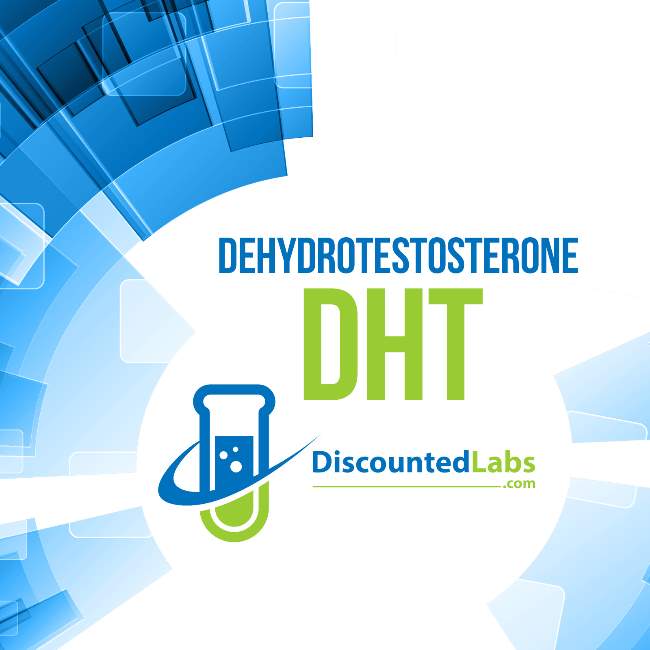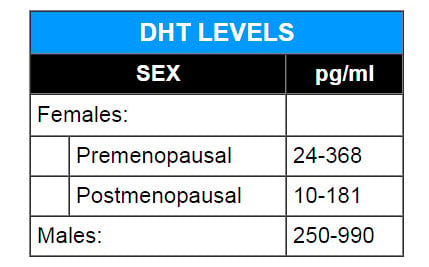Should I Use a DHT Blocker?

Except for estradiol, no hormone is more misunderstood than dihydrotestosterone, or DHT. Many men fear DHT, going out of their way to use a DHT blocker. However, DHT is a critical hormone, one that men need for sexual and prostate health, cognitive function, skeletal strength – and many other reasons. Like everything in life, there are downsides to DHT, but the upside of healthy DHT levels far outweighs the challenges it can present.
Table of Contents
DHT – FRIEND OR ENEMY?
Except for estradiol, no hormone is more misunderstood than dihydrotestosterone, or DHT. Many men fear DHT, going out of their way to lower it and frustrate its biological activity. However, DHT is a critical hormone, one that men need for sexual and prostate health, cognitive function, skeletal strength – and many other reasons. Like everything in life, DHT has downsides, but the upside of healthy DHT levels far outweighs the challenges it can present.
DHT – Where it Comes From
The principal hormone produced in men is, of course, testosterone. When testosterone is produced by the testicles (or injected/absorbed by a man on testosterone replacement), an enzyme, 5-alpha reductase(5-AR), sets to work, converting a portion of that testosterone to DHT. This conversion prevents some testosterone from reaching the androgen receptors in the brain, genitals, skin, and other tissues. Initially, that may sound like the body is deprived of a needed hormone – testosterone. However, for the most part, this conversion is actually in a man’s best interest. Though estimates vary, DHT binds much more efficiently to androgen receptors; DHT is 300 to 500 percent more efficient at reaching and binding to the receptors and is far more potent than testosterone. If tissues were deprived of DHT, 5-AR hadn’t done its job; there would be dramatic physiological changes. While it is true that testosterone remains the primary, active androgen in muscle/muscle development, DHT is still critical for testosterone's full performance-enhancing effects. Specifically, the impact of DHT on the central nervous system increases neurological efficiency/strength.
DHT – Positive Effects
To understand DHT’s androgenic properties, consider the following.
- Male Development – Physical and sexual development in the human male is DHT-dependent. DHT is responsible for the growth and development of the penis, the prostate, and the testicles. It not only helps with sex differentiation during fetal development but also supports the changes that occur during puberty and adulthood.
- Libido – DHT supports a healthy sex drive. Men with optimal levels of the hormone report a far stronger drive than men with lower levels.
- Prostate Health – Men with balanced levels of DHT may have fewer prostate health issues.
- Cognitive Function – One study indicated that administering DHT to men between 34 and 70 resulted in memory improvements. The androgenic properties of the hormone encouraged the retrieval of stored memories and the archiving of new ones. Low/lower levels of DHT were linked to a decline in cognitive function in elderly men.
- Blood Sugar Management – Higher levels of DHT help to reduce the risk of diabetes by controlling sugar levels and preventing hyperglycemia. DHT can improve insulin sensitivity, support efforts to lose weight, and may provide adjunctive support in treating diabetes.
- Cardiovascular Health – Men with coronary artery disease may benefit from higher levels of DHT since lower hormone levels have been shown to increase the risk of cardiovascular disease. It may be a simple association – higher levels of DHT might lower the mortality associated with heart disease.
- Stroke Risk – Researchers followed a group of men for six years and learned that higher levels of DHT and testosterone seemed to lower the risk of stroke.
- Depression – In one study, men who used finasteride, a drug that blocks 5-AR and, thus, generates lower levels of DHT, had higher rates of depression than a control group. DHT may well be necessary to support mental and emotional health.
- Anti-Aging – Higher levels of DHT, testosterone, and estradiol seem to slow the decline associated with aging. Lower levels of all three hormones brought about cellular changes seen in the elderly. Higher levels were associated with “younger” cellular function.
- Bone and Skeletal Health – Along with estradiol, appropriate levels of DHT support and maintain bone density in men.
DHT – The Downside
The DHT story is firm but not universally positive. The drawbacks of DHT must be considered.
- Baldness – Hair loss is probably the number one DHT – harmful in the minds of most men who are involved in testosterone therapy. Studies have shown that higher levels of DHT are linked to increased male-pattern baldness. In women, elevated levels of DHT can lead to male-like hair growth patterns.
- Cancer – DHT is critical for the normal development of the prostate, but high hormone levels have been associated with prostate cancer risk. However, studies on DHT and prostate cancer are contradictory.
- Acne – Inflammatory acne flares have been linked to DHT.
DHT – The Bottom Line...a Friend or Foe?
For men, DHT is a friend and an important one. However, like virtually every hormone in the body, the key to health is balance. If DHT levels drop too far, men open themselves to low libido.
DHT is not likely to be tested in most men undergoing testosterone replacement therapy. Some clinicians fail to recognize the importance of DHT for men’s health and libido, so they fail to monitor it. It’s entirely possible, even likely, that some men are not obtaining the maximum benefits of testosterone replacement because (unbeknownst to them) their DHT levels are not optimal.
DiscountedLabs.con offers a highly affordable DHT test to help you determine if your body is producing sufficient DHT. The DHT test is quick, easy to administer, and reliable.

How to Increase DHT
There are natural ways to boost DHT levels if one is not on a testosterone replacement protocol. Here are a few things that can be done.
- Exercise more – particularly resistance training and high-intensity training.
- Increase your intake of caffeine, creatine, or green tea supplements.
- Boost the amount of zinc in your diet via the food you eat or a supplement.
- Take a DHEA supplement if your DHEA blood level is low. Get a DHEA blood test
- Lose weight.
- Optimize your testosterone blood level is low.
- Last but not least, use a scrotal testosterone cream. Applying compounded (alcohol-free) testosterone cream to the testicular skin has increased DHT considerably.
Using a DHT Blocker to Lower DHT
It should be clear that most men have no reason to suppress their DHT levels. However, Propecia is regularly prescribed as a DHT blocker for men anxious about losing their hair. As was noted, Propecia will stop or suppress the 5-AR activity that produces DHT. By blocking or slowing the work of 5-AR, male pattern baldness, one of the possible adverse side effects that DHT can have, may be prevented or arrested. Unfortunately, there is evidence that some men who take this medication may risk lowering their libido and mood.
For reasons still not clearly understood, this medication can produce a syndrome in some men very similar to those symptoms associated with hypogonadism. Loss of libido, weak erections, malaise, and fatigue plague many men even after they have stopped using the drug. While it’s true that no one wants to lose their hair, no man wants to wind up with what has come to be known as post-finasteride syndrome.
With proper attention, DHT can be a friend and ally in the search for optimal health. Don’t fear it – accept it and have it work to your advantage.
In Summary:
Dihydrotestosterone (DHT) is a hormone that plays a key role in the development of male characteristics in people assigned male at birth (AMAB) [1]. DHT is an androgen hormone that stimulates the growth of facial, body, and pubic hair, as well as the growth of the penis, scrotum, and prostate during puberty in AMAB individuals [3]. It is derived from testosterone, which is present in both men and women [4].
However, DHT can also contribute to male pattern hair loss as it is thought to cause hair follicles to miniaturize [2]. Finasteride, which is commonly used to treat male pattern baldness, works by blocking the formation of DHT [5].
DHT also plays a crucial role in men's overall health. It is necessary for an energetic and athletic body and is a vital component of a healthy hormone profile [8]. In fact, DHT is an effective mood booster and can have neurological effects that last longer than those of testosterone [6]. However, abnormal levels of DHT and other androgens can lead to various health problems, such as low libido, erectile dysfunction, and prostate issues [9].
Overall, DHT is a hormone that is essential for the development of male characteristics during puberty and for maintaining men's overall health. While it is important for various bodily functions, abnormal levels of DHT can lead to health problems, and treatments such as finasteride can help regulate DHT levels [5].
Buy Your DHT TEST HERE





